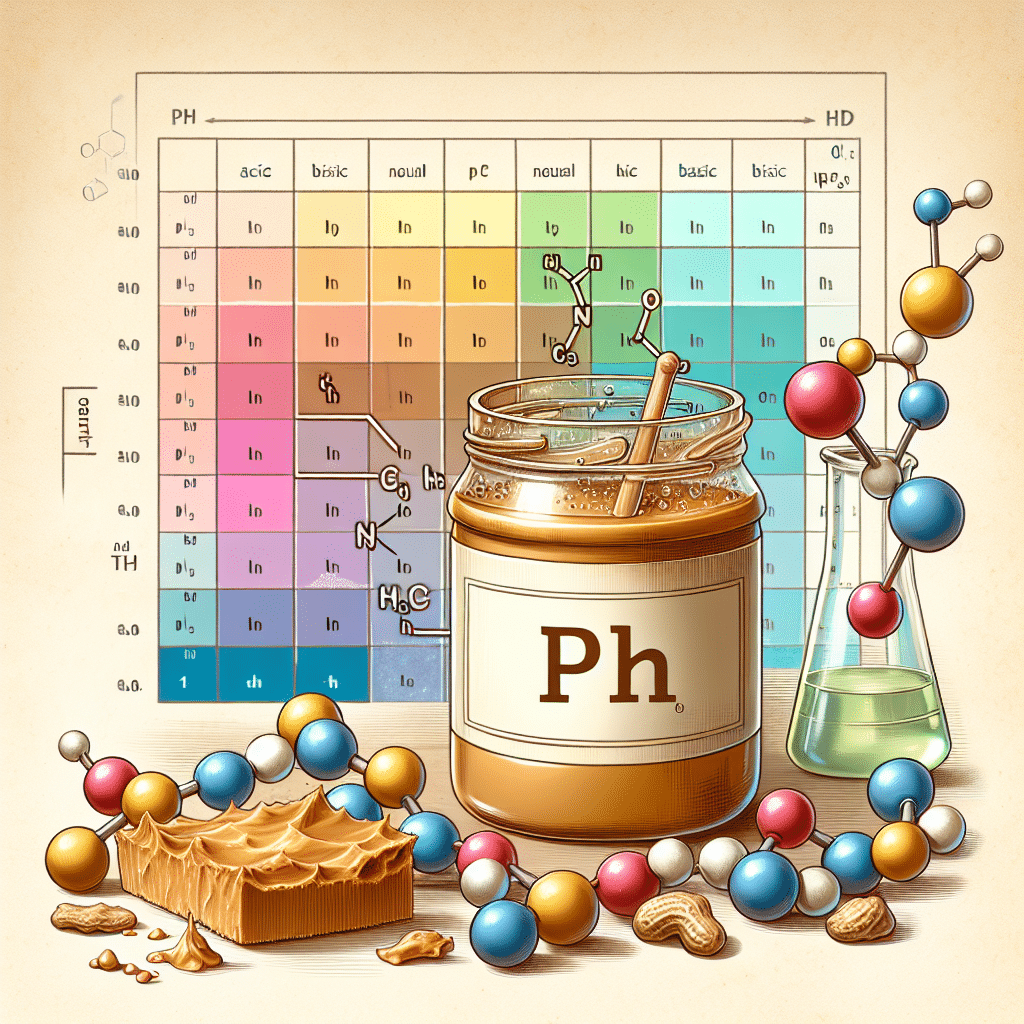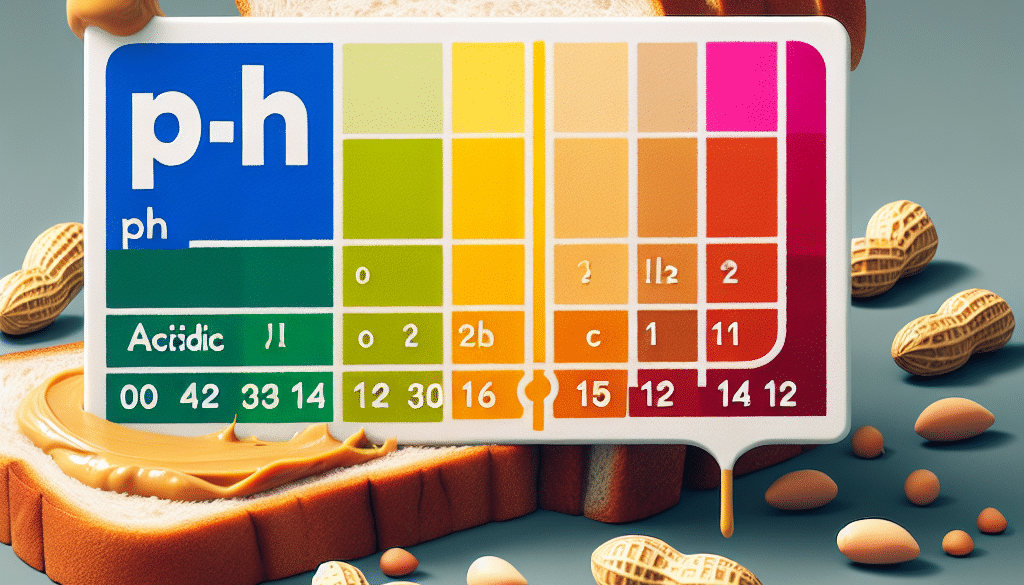pH of Peanut Butter: The Acidic Profile
-
Table of Contents
- Understanding the pH of Peanut Butter: An Acidic Profile Examination
- What is pH and Why Does it Matter?
- The pH Range of Peanut Butter
- Factors Influencing the Acidity of Peanut Butter
- Health Implications of Peanut Butter’s pH
- Shelf Life and Preservation
- Impact on Digestion
- Case Studies and Research
- Consumer Preferences and Dietary Choices
- Conclusion: Key Takeaways on Peanut Butter’s pH
- Discover ETprotein’s High-Quality Protein Products
Understanding the pH of Peanut Butter: An Acidic Profile Examination

Peanut butter is a staple in many households, cherished for its creamy texture and rich flavor. It’s a versatile food, often used in sandwiches, smoothies, and a variety of recipes. However, beyond its taste and culinary uses, the pH level of peanut butter is a topic of interest for both consumers and food scientists alike. Understanding the acidic profile of peanut butter is important for various reasons, including its impact on digestion, shelf life, and suitability for certain diets. In this article, we delve into the pH of peanut butter and explore the factors that contribute to its acidity.
What is pH and Why Does it Matter?
pH is a measure of how acidic or basic a substance is. The pH scale ranges from 0 to 14, with 7 being neutral. A pH less than 7 indicates acidity, while a pH greater than 7 indicates alkalinity. The pH of food can affect its flavor, texture, preservation, and how it interacts with our body. For individuals with certain health conditions, such as acid reflux, the acidity of foods can be a significant concern.
The pH Range of Peanut Butter
Peanut butter typically has a pH range of 6.1 to 6.5, making it slightly acidic. This mild acidity is due to the presence of fatty acids and amino acids in peanuts. The exact pH level can vary depending on the brand, ingredients, and processing methods used to make the peanut butter.
Factors Influencing the Acidity of Peanut Butter
- Processing: The way peanuts are processed into butter can affect the pH. Roasting peanuts can lead to the formation of compounds that influence acidity.
- Additives: Some brands add ingredients like sweeteners, salt, or preservatives, which can alter the pH balance.
- Natural Variation: Peanuts, like all natural products, can have variations in their chemical composition, leading to slight differences in pH.
Health Implications of Peanut Butter’s pH
While the slight acidity of peanut butter is not a cause for concern for most people, it can be significant for those with acid-sensitive conditions. However, the fat content in peanut butter can help buffer stomach acid, potentially reducing the impact of its acidity.
Shelf Life and Preservation
The pH level of peanut butter can influence its shelf life. Foods with lower pH levels tend to resist microbial growth better, which can help peanut butter stay fresh longer. However, proper storage is essential to prevent spoilage.
Impact on Digestion
The body’s digestive system is well-equipped to handle a range of pH levels. Peanut butter’s mild acidity is unlikely to cause digestive issues for most people. In fact, the high protein and healthy fat content can promote satiety and aid in digestion.
Case Studies and Research
Several studies have examined the pH levels of various peanut butter brands and their impact on health. For example, research has shown that natural peanut butters without additives tend to have a more neutral pH compared to those with added ingredients.
Consumer Preferences and Dietary Choices
Some consumers prefer peanut butter with a more neutral pH, which can be found in natural or organic varieties. Those following an alkaline diet may also pay closer attention to the pH levels of their food, including peanut butter.
Conclusion: Key Takeaways on Peanut Butter’s pH
In summary, peanut butter’s slightly acidic profile is influenced by factors such as processing and additives. While its pH level is an interesting aspect to consider, it does not typically pose health concerns for most individuals. Understanding the acidity of peanut butter can help consumers make informed choices based on their dietary needs and preferences.
Discover ETprotein’s High-Quality Protein Products
If you’re looking for protein-rich foods to complement your diet, consider ETprotein’s range of organic bulk vegan protein and plant proteins. Their products, including peanut protein, are known for their neutral taste and non-GMO, allergen-free attributes, making them a great addition to any health-conscious consumer’s pantry.
About ETprotein:
ETprotein, a reputable protein Chinese factory manufacturer and supplier, is renowned for producing, stocking, exporting, and delivering the highest quality organic bulk vegan protein and plant proteins. They include Organic rice protein, clear rice protein, pea protein, clear pea protein, pumpkin seed protein, sunflower seed protein, mung bean protein, peanut protein etc. Their offerings, characterized by a neutral taste, non-GMO, allergen-free attributes, cater to a diverse range of industries. They serve nutraceutical, pharmaceutical, cosmeceutical, veterinary, as well as food and beverage finished product distributors, traders, and manufacturers across Europe, USA, Canada, Australia, Thailand, Japan, Korea, Brazil, and Chile, among others.
ETprotein specialization includes exporting and delivering tailor-made protein powder and finished nutritional supplements. Their extensive product range covers sectors like Food and Beverage, Sports Nutrition, Weight Management, Dietary Supplements, Health and Wellness Products, and Infant Formula, ensuring comprehensive solutions to meet all your protein needs.
As a trusted company by leading global food and beverage brands and Fortune 500 companies, ETprotein reinforces China’s reputation in the global arena. For more information or to sample their products, please contact them and email sales(at)ETprotein.com today.












